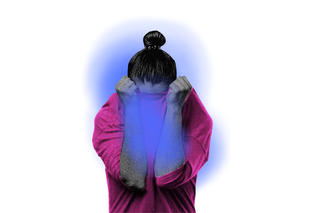
How Extreme Self‑Focus Can Prevent ‘Shy’ People From Bonding With Others
“[S]hy individuals may focus their attention inwards during new social interactions… imped[ing] the attention that should be paid to the social partner.”

If you’re a shy person, you may have found yourself fixating on that minuscule juice stain on your top, the tiny pimple on your face, or that barely audible groan your stomach just made. Especially around new company, one who’s shy might feel overtly self-focused — often worrying that they’ll be judged negatively for even shifting in their seat to achieve a comfortable position.
Published in the Journal of Research in Personality, a new study explores just how shyness represses our ability to bond with people. Turns out, that the extreme degree of self-focus that shyness is often accompanied by, might prevent us from being able to connect to new people — keeping us from feeling comfortable in their company in the long run. In a way, then, shyness can become a rather vicious cycle.
The researchers sought to investigate the impact of overt self-focus on behavioral mimicry — the spontaneous mirroring of the gestures, postures, and mannerisms of someone we’re interacting with socially. According to a statement by lead author Kristie Poole from the department of psychology at the University of Waterloo, the phenomenon “is thought to be adaptive as it signals social interest, increases interpersonal liking, and facilitates smooth social interactions… Because shy individuals tend to experience nervousness during new social interactions, we wanted to examine if they would be less likely to display this adaptive social behavior.”
The study included 150 participants, who completed questionnaires to measure their shyness. Their behavior was then examined during an online social interaction with an experimenter on Zoom. The researchers found that 42% of participants mimicked the experimenter at least once. Their self-focused attention was also assessed through their responses to statements such as “I was focusing on my internal body reactions” and “I was focusing on the impression I was making on the other person.”
Related on The Swaddle:
How Pop Culture Paints an Unhealthy, Unsustainable Picture of Friendships
To ensure that knowledge of the study’s objective didn’t impact the participants’ behavior and the results weren’t thus tarnished, they were told that the research they were participating in sought merely to examine how different personality traits related to people’s perceptions of online platforms.
Upon analysis of all the data thus complied, the researchers were able to conclude that participants, who were more shy than others, indulged in greater self-focus and also exhibited lesser behavioral mimicry. “We interpret this finding to suggest that shy individuals may focus their attention inwards during new social interactions — e.g., [by] focusing on their racing heart — which may impede the attention that should be paid to the social partner, and ultimately play a role in lowering the likelihood that they are to engage in behavioral mimicry,” Poole explained.
To an extent, then, the impact of shyness on people seems akin to the “spotlight effect,” a term coined by American psychologists Thomas Gilovich and Kenneth Savitsky, which refers to people grossly overestimating the attention people are paying to their flaws — leading them to believe that everyone is observing their smallest moves, and keeping a close note of their failures, as though we were under a literal spotlight.
The spotlight effect has often been linked to social anxiety. Eileen Purdy, an anxiety therapist, once noted that “With social anxiety, the spotlight is felt in a blazing, behavior-changing, self-conscious, judging, and ultimately paralyzing way.” Basically, the spotlight effect can be debilitating for people with social anxiety. Now, the question is whether the self-focused behavior demonstrated by shy individuals is just another manifestation of the spotlight effect. Unfortunately, however, the present research doesn’t really delve into that.
Related on The Swaddle:
Pandemic Isolation Has Been a Relief for Many Who Don’t Fit into Society’s Norms
It might also be pertinent to note, though, that while “shyness” and “social anxiety” are terms that are often used interchangeably, they aren’t the same. Experts note that shyness is a personality trait while social anxiety is a recognized mental health disorder. However, the former can devolve into the latter over time. As such, an interesting direction for future research could, perhaps, be to test whether the observed self-focused behavior among shy individuals, too, can take the form of the spotlight effect if one’s shyness begins to tend towards social anxiety.
Poole, too, has a few ideas in mind for what future research focusing on the intersection of shyness, self-focused behavior, and behavioral mimicry could look like. For starters, she wants to find out if self-focus is similarly heightened for a shy person while they are in the company of familiar people, as it was during interactions with unfamiliar individuals.
Yet another fascinating research question that interests Poole is whether shyness results in greater self-focus during interactions where one isn’t expected to participate actively. In the present experiment, the participants were “expected and asked to respond to questions by the experimenter.” The question, now, is whether shyness can in fact have the opposite effect in more passive social contexts. “Where the individual can take on an observant role, shyness may be related to more behavioral mimicry as a means of blending in with the social environment and staying out of the spotlight… like ‘the chameleon effect,'” she noted.
With people experiencing more social anxiety after months of pandemic-spawned social isolation, this might be a good time to explore Poole’s questions through further research.
Devrupa Rakshit is an Associate Editor at The Swaddle. She is a lawyer by education, a poet by accident, a painter by shaukh, and autistic by birth. You can find her on Instagram @devruparakshit.
Related


Ultra‑Processed Foods in Diet Linked to Higher Risk of Dementia: Study
